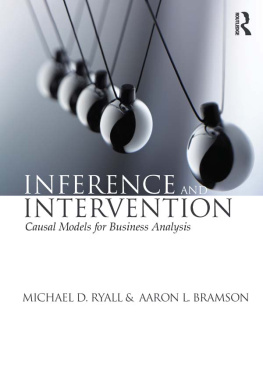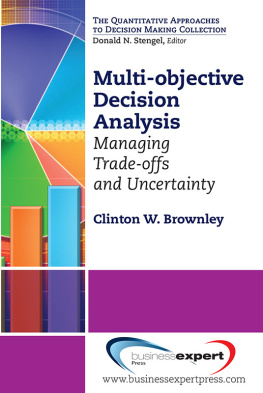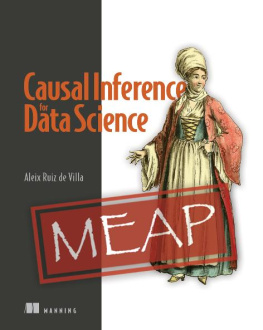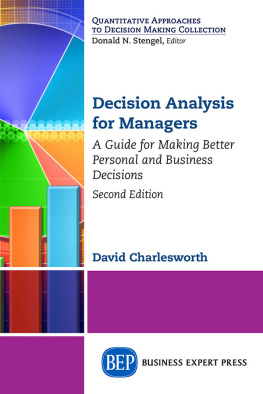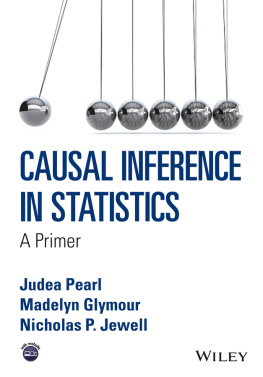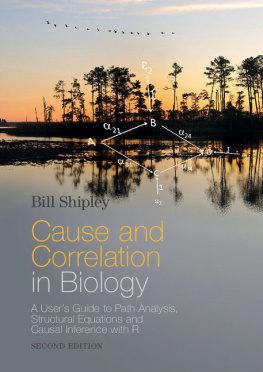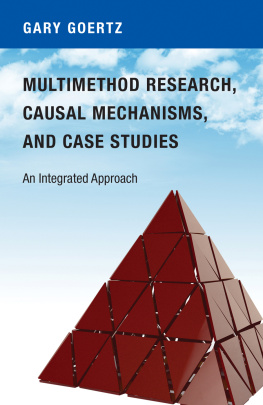Inference and Intervention
Ryall and Bramson's Inference and Intervention is the first textbook on causal modeling with Bayesian networks for business applications. In a world of resource scarcity, a decision about which business elements to control or change as the authors put it, a managerial intervention must precede any decision on how to control or change them, and understanding causality is crucial to making effective interventions.
The authors cover the full spectrum of causal modeling techniques useful for the managerial role, whether for intervention, situational assessment, strategic decisionmaking, or forecasting. From the basic concepts and nomenclature of causal modeling to decision tree analysis, qualitative methods, and quantitative modeling tools, this book offers a toolbox for MBA students and business professionals to make successful decisions in a managerial setting.
Michael D. Ryall is an Associate Professor of Strategy at the University of Toronto. He holds a PhD in economics from the University of California, Los Angeles and an MBA from the University of Chicago. He is President of the Strategy Research Initiative, a scholarly society dedicated to the advancement of research in the field of management. His primary research interest is the game-theoretic foundations of business strategy and his work has been published in leading international journals. Ryall teaches courses on advanced strategy analysis and on causal modeling to undergraduate, MBA and EMBA students. Prior to obtaining a PhD and becoming a full-time scholar, he held positions in consulting, general management and finance.
Aaron L. Bramson received a PhD from the University of Michigan in 2012 in a joint program with the departments of political science and philosophy, as well as earning UM's graduate certificate in complexity in 2008. He holds an MS in mathematics from Northeastern University, as well as a BS in economics and a BA in philosophy from the University of Florida. Aaron's research specialty is complexity science, methodology for modeling complex systems, and measuring dynamics in large datasets. He is currently a researcher at the RIKEN Brain Science Institute in Japan. Previously, he worked as a research fellow in the Rotman School of Management at the University of Toronto, as a software engineer at Lockheed Martin Corporation, and has taught numerous workshops on complexity, networks, and agent-based modeling around the world.
Inference and Intervention
Causal Models for Business Analysis
Michael D. Ryall &
Aaron L. Bramson

First published 2014
by Routledge
711 Third Avenue, New York, NY 10017
Simultaneously published in the UK
by Routledge
2 Park Square, Milton Park, Abingdon, Oxon OX14 4RN
Routledge is an imprint of the Taylor & Francis Group, an informa business
2014 Taylor & Francis
The right of Michael Ryall & Aaron Bramson to be identified as the authors of this work has been asserted by them in accordance with sections 77 and 78 of the Copyright, Designs and Patents Act 1988.
All rights reserved. No part of this book may be reprinted or reproduced or utilised in any form or by any electronic, mechanical, or other means, now known or hereafter invented, including photocopying and recording, or in any information storage or retrieval system, without permission in writing from the publishers.
Trademark notice: Product or corporate names may be trademarks or registered trademarks, and are used only for identification and explanation without intent to infringe.
Library of Congress Cataloging in Publication Data
Ryall, Michael D.
Inference and intervention: causal models for business analysis /
Michael D. Ryall & Aaron L. Bramson.
pages cm
Includes bibliographical references and index.
1. Decision making-Mathematical models. 2. Decision making-Statistical
methods. 3. Business planning-Statistical methods. I. Bramson, Aaron L. II. Title.
HD30.23.R92 2013
| 658.40101519542-dc23 | 2013005927 |
ISBN: 978-0-415-65759-4 (hbk)
ISBN: 978-0-415-65760-0 (pbk)
ISBN: 978-0-203-07683-5 (ebk)
Typeset in Berling
by Cenveo Publisher Services
Contents
The roots of this book can be traced back to the mid-1990s, during which time, one of us (Ryall) had the great good fortune to stumble into Judea Pearl's graduate class on causal modeling, during his PhD studies at UCLA. That experience led to a dissertation exploring the implications of formal notions of causality, as conceived by Pearl and others in the artificial intelligence community, for game theory. Judea Pearl was nothing less than inspirational, as were Ryall's supervisors on the economics side Brian Ellickson, David Levine and Bill Zame all of whom were incredibly supportive of what was, then, a fairly unconventional line of research in game theory.
Since the 1990s, it is safe to say that causal modeling has gone mainstream. Not only are there now a multitude of books on the topic, ranging from scholarly monographs to practice-oriented texts, but so is there a multitude of software tools, ranging from very sophisticated, commercial-grade programs to simpler, open access software. Though the importance of causal modeling in business settings is clear from its widespread adoption in large corporations, we were surprised to find that there were no books aimed specifically at the business audience.
The opportunity to correct that omission arose when we were asked to teach the Integrative Thinking Practicum in the Rotman School of Management at the University of Toronto. Intended to be a capstone, first-year MBA course involving modeling of some kind, we decided that causal modeling was the way to go. The causal modeling approach provides an excellent framework with which students can integrate ideas learned in their disciplinary courses to solve multifaceted, real-world problems. As a result, we developed the material that follows and taught it in the core curriculum in the years 2010 and 2011, delivering it to over 500 students. We then refined and expanded our coverage which, eventually, became this book. Since then, we have also successfully taught the material as an upper-division undergraduate course as well as a second-year MBA elective.
We give special thanks to Mihnea Moldoveanu and the Desautels Centre for Integrative Thinking for their incredible support, without which this book would not have been possible. We thank our many colleagues at Rotman for their encouragement during the development of our Integrative Thinking Practicum, especially Joel Baum, Peter Pauly, Will Strange and Glenn Whyte. We benefited from discussions with many colleagues, in particular Max Chickering, Joshua Gans, Avi Goldfarb, Sarah Kaplan, and Mara Lederman. Rekha Morbia and Sally Smith provided essential administrative assistance throughout the course and book development. We also thank John Szilagyi, Manjula Raman, and the reviewers at Routledge for their assistance in bringing this book to press.
In 2009, one of us (Ryall) had the pleasure of participating as a judge in the McKinsey Case Competition held at the Rotman School of Management, University of Toronto. Case competitions are an established feature of the student experience in modern MBA programs. The details vary from competition to competition, but the essential idea is to provide students with a brief (~15 page) description of a problem facing a particular firm, give them a week to mull it over, then have them present their recommendations and supporting analyses before a panel of experienced judges.

